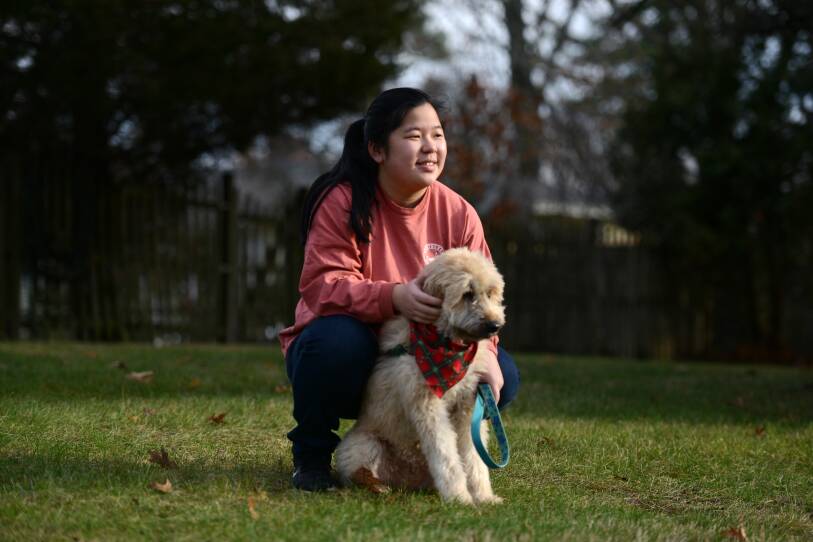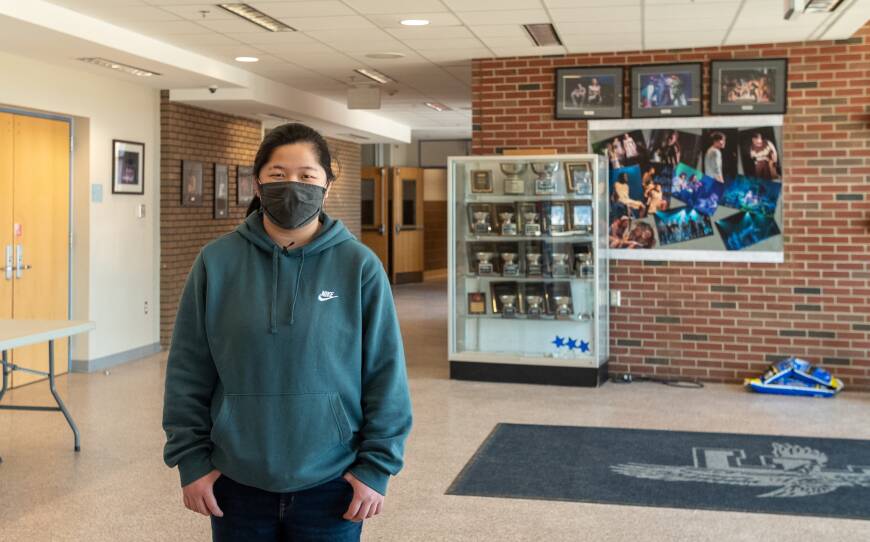After over a year of Zoom classes alone in her room, Bridget Donovan returned to school for the last few months of her senior year. She found herself suddenly confronted by the sound of the bell, the busy hallways and — perhaps most terrifying of all — in-person classes with students who had previously only existed on a screen — many of them just names on a black square.
“I was sitting next to this, this girl and I'm like, I don't know who you are,” Donovan said. “I was like, I don't know. Is that really weird if I ask them their name?”
Last year, Framingham High School went fully remote. As the eighteen-year-old Donovan — who has chronicled her senior year as part of GBH News'COVID and the Classroom series — adjusted to a new way of life, she found herself forgetting how things were before, how to socialize, make friends, or even keep up a conversation.
“Having these Zoom meetings or FaceTime or texting with my friends, then seeing them every day again, it was like, whoah,” Donovan said. “Now I can't just shut off my phone and, you know, kind of take that mental space, that mental break.”
Donovan is not alone in struggling to rebuild a social life, says Mario Small, a professor of sociology at Harvard University.
"The number of people across all walks of life who report just forgetting how to interact with people in person is quite high,” Small said.
We’re all — according to Small — feeling a little weird right now.
“I think essentially what's happening is now we're sort of slowly — some more slowly than others — interacting with others again,” Small said. “And we have new habits that don't work in these circumstances.”
Small says we're all kind of processing a cognitive overload — not just from having to think about putting on real pants, but from all our new social etiquette that we haven't quite established yet.
“Do you hug people, do you shake hands, do you shake hands but then wipe it with hand sanitizer, do you remove your mask or not remove your mask, do you show your vaccination card and then remove your mask?” Small said. “There's no protocol for the transition from total isolation through some semblance of normality.”
The pandemic has also made our social circles a lot smaller. Without seeing people every day at school or at the office, our relationships with them may have grow weaker, Small says.
“Then you realize, well, this maybe wasn't exactly what I thought this person was in my life,” he said. “It'll be really interesting to see what happens for all of those people who we just decided they weren't worth the effort. What happens when now, without effort, we get to see them again?”

Bridget Donovan experienced that first-hand: throughout the course of the past year, she realized that sustaining a friendship requires a lot of effort, which isn't something most high school students have to confront when they see their classmates every day in-person.
“I guess I was able to separate like my school friends from my real friends,” she said. “My school friends … we were only friends because we saw each other five days a week, every single day.”
Donovan says some of her friends also just didn't have the ability to check in on the friendship, that when things got tough, the friendship fell apart.
“It was so easy before COVID-19 to take friendships for granted, and then COVID happened and I realized that I'm the only one putting in effort,” Donovan said. “I was the only one kind of keeping these friendships alive and kind of checking in on them, making sure they're OK, knowing that this is stressful for a lot of people. A lot of people are dealing with a lot and coping in different ways.”
This year has been hard for almost everyone — not just with the pandemic, but with more of us watching the news, processing huge cultural changes and a world of unknowns.
Even though her friends have been a support system, Donovan says she's sick of having tough conversations.
“Someone's like, 'How are you?' And I'm like, 'You want the long answer or the short answer?'” she said. “I could say 'I'm good,' and then we end this conversation — or I'll tell you the truth, and that’s going to go into a big, long thing of 'I'm tired, I'm stressed.'"
The path forward, according to journalist and public speaker Celeste Headlee, is to confront the trauma head-on.
“It has been harder for some people than for others, and there's nothing to be ashamed of,” Headlee said. “It's been tough and it's OK to just acknowledge that elephant in the room.”
Socializing now, even for a little bit, feels exhausting. But Headlee says it's not the socializing that's exhausting us — we've just already reached our limit.
“People are just exhausted in general,” she said. “And the Zoom calling and video conferencing in particular is very, very tiring to your brain.”

In her book, "We Need To Talk: How To Have Conversations That Matter," Headlee suggests that social media kind of tricks us into thinking we're connected, but actually just makes us more tired.
“You have to think of your social energy like your gas tank,” Headlee said. “If you're spending a bunch of time on Facebook and Twitter, what's happening is you're expending all of that gas, but you're getting nothing in return.”
Headlee says in the early days of re-emergence, the conversations that count are the small ones, like a chat with your barista or your grocery store clerk.
“Scientific research shows that those really short exchanges, something that sociologists call ‘weak ties,’ are very beneficial for your mood and your stress levels,” Headlee said, “and yet they're super low stakes.”
It's going to take some work to make new connections, but Headlee says putting ourselves out there is the first step to rebuild our social lives.
“There's a researcher named Nicholas Epley. He says, you know, nobody waves, but almost everybody waves back,” Headlee said. “Be the one that waves, because people will wave back at you.”
This fall, Donovan will begin her first year at college — in person, at a school where she doesn't know anyone.
“Even though it is going to be hard, I know that I am willing to take that risk,” Dononvan said, “putting myself out there and meeting new people.”
Donovan says she knows she can't jump in tomorrow at 100 percent, but little by little, she'll work to be the one that waves.








